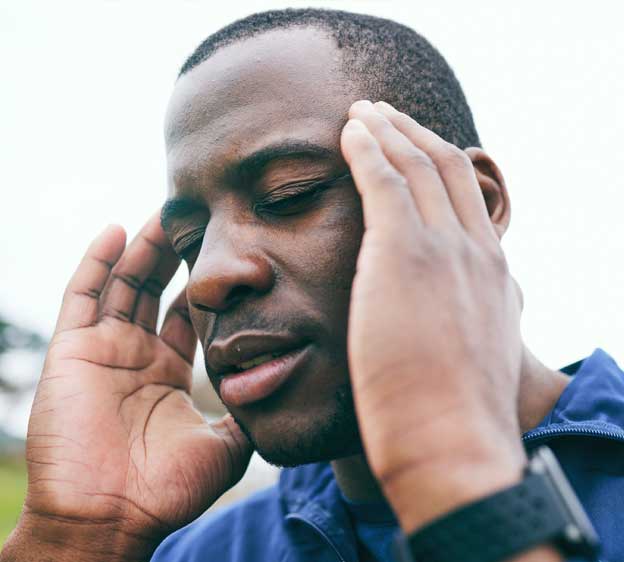
Concussions are a common type of traumatic brain injury that can result from a variety of situations. Whether it's a sudden impact from a fall, a collision during sports or an accidental bump against a hard surface, these events can cause the brain to move rapidly within the skull. This movement may disrupt normal brain function, leading to temporary symptoms that can be concerning.
“It’s important to be aware of the signs of a concussion and understand the steps to take for a safe recovery,” says James Varner, a board-certified physician assistant at Beaufort Memorial Lowcountry Medical Group Primary Care. “Recognizing the condition right away can help prevent further complications.”
What is a Concussion?
A concussion happens when the brain is shaken back and forth inside the skull. Concussions often follow a blow to the head from contact sports or falls. This type of injury can also happen when the body experiences a forceful impact, such as during a car crash. Some of the most common causes of concussions include:
- Hits to the head during sports or recreational activities
- Accidents such as falls or collisions that cause a blow or jolt to the head
- Head injuries from daily activities, such as tripping and striking your head on a hard surface
While many concussions are mild, it’s important to monitor for any unusual symptoms after an injury and seek medical care right away if you think you might have a concussion.
Read More: Head Off Sports Injuries Before They Happen
What Are the Symptoms of a Concussion?
A concussion doesn’t always involve a temporary loss of consciousness or someone passing out, which is what many people believe.
“Symptoms are often most severe right after the injury happens, but other symptoms can develop and appear later,” Varner says.
Immediate symptoms of a concussion can appear right after the injury happens and may include:
- Headache (the most common symptom)
- Dizziness or confusion
- Slurred speech
- Temporary memory problems
- Blurry vision, double vision or one pupil larger than the other
- Nausea or vomiting
- Loss of consciousness
Some symptoms may not appear until days after the injury, including:
- Sensitivity to light or noise
- Restlessness or anxiety
- Feeling unusually tired or lacking energy
- Trouble concentrating
In some cases, you may experience post-concussion syndrome, which occurs when concussion symptoms are still present for weeks or even months after the injury.
Read More: Why Sudden Blurry Vision May Be a Medical Emergency
Pediatric Needs: Concussion Symptoms in Children
Young children may not be able to express how they feel. Monitor their condition following any type of head injuries or accidents. Watch for signs like:
- Increased irritability or anxiousness
- Changes in sleep or eating habits
- Losing interest in their favorite toys or activities
It’s important to look out for and recognize these signs and symptoms as soon as possible so the child can receive medical care quickly if needed.
What Should You Do If You Think You Have a Concussion?
If you think that you or someone else has a concussion, taking the right steps quickly is critical.
“If the injury occurred during a contact sport or other physical activity, stop immediately to avoid further harm,” Varner says. “Monitor symptoms, paying particular attention to how the injured person feels over the next few hours and days. Look for symptoms like worsening headaches, confusion or vomiting.”
Seek emergency care immediately if the person has any of these symptoms:
- Can’t stay awake or won’t wake up after losing consciousness
- Has a headache that won’t go away
- Has convulsions or seizures
- Has repeated vomiting or nausea
- Experiences severe headaches or confusion
- Has slurred speech
- Has one eye pupil larger than the other or double vision
- Has weakness or numbness or can’t keep their balance
- Has difficulty recognizing people or places
- Is a baby or small child who can’t stop crying or won’t nurse or eat
Delaying care can lead to serious complications, so don’t hesitate to seek help if your symptoms get worse. Even if the symptoms don’t seem that bad at first, seeing a health care provider is important. They can evaluate the injury, provide a diagnosis including whether or not it is a concussion, and recommend steps for recovery. Ignoring symptoms could lead to long-term issues, such as memory problems or difficulty concentrating.
How Do Health Care Providers Diagnose a Concussion?
Health care providers use a variety of methods to diagnose concussions:
- Neurological exam: This involves checking memory, reflexes, balance and coordination
- Imaging tests: A CT scan or MRI may be used if a more serious brain injury is suspected
“The diagnosis process helps determine how severe the injury is and whether other tests or treatments may be necessary,” Varner says.
How Are Concussions Treated?
Treatment for a concussion focuses on rest and recovery. A health care provider will typically recommend:
- Resting your brain and body: Get enough sleep, avoid activities that strain your brain too much, and reduce time using screens like phones, computers or TV.
- Avoid bright lights and noise: Bright lights and loud noises can make your symptoms worse.
- Avoid driving: Have a friend or family member take you where you need to go while you recover.
- Gradually returning to activities: Once your symptoms improve, your health care provider may guide you in slowly resuming daily tasks and exercise.
- Monitoring symptoms: Keep track of how you feel and seek follow-up care from your health care provider if symptoms worsen or don’t go away.
If you or a loved one experiences other symptoms, such as blurry vision or sudden confusion, it’s important to seek care right away.
Preventing Concussions
While concussions can’t always be avoided, there are steps you can take to reduce your risk:
- Keep your home safe: Avoid trip hazards like throw rugs and steps in dark places where you might trip and fall.
- Wear your seat belt: Be safe and wear your seat belt any time you’re driving or riding in a car.
- Use protective gear: Helmets are essential for athletes who play contact sports like football or hockey. Proper equipment helps absorb the impact of blows to the head.
- Follow safety rules: Coaches and parents should teach players safe techniques to avoid dangerous hits to the head.
- Know the signs: Recognizing concussion symptoms early allows for prompt care, reducing the risk of long-term complications.
If you or a loved one is experiencing a medical emergency, call 911. For non-emergency concerns, schedule a visit with a health care provider to get the care you need.

